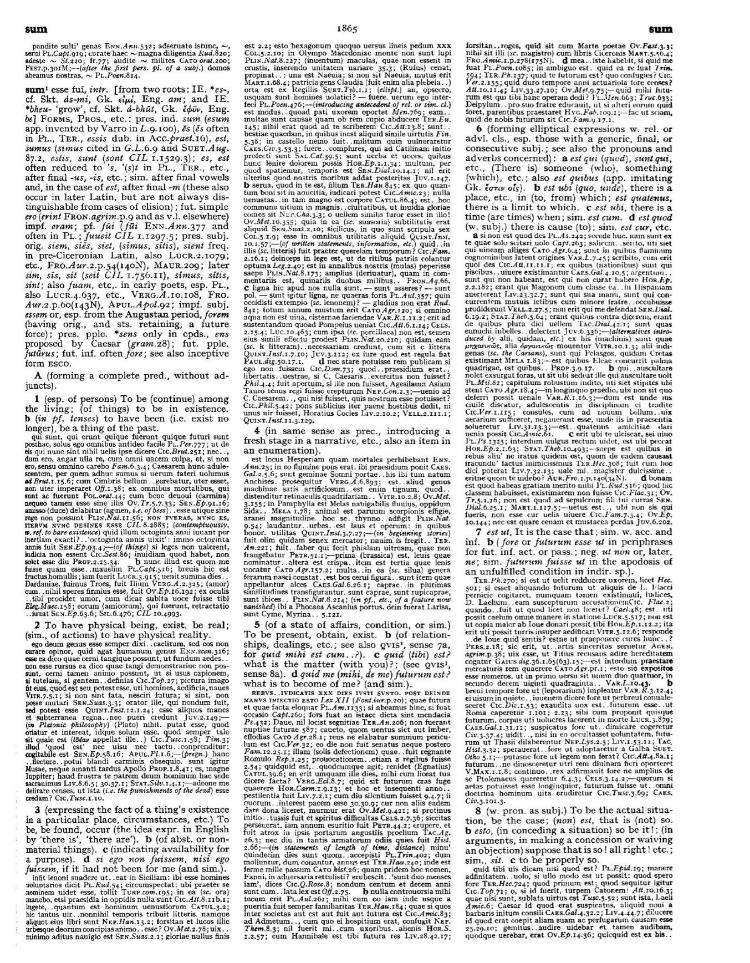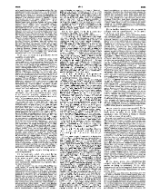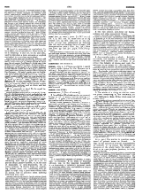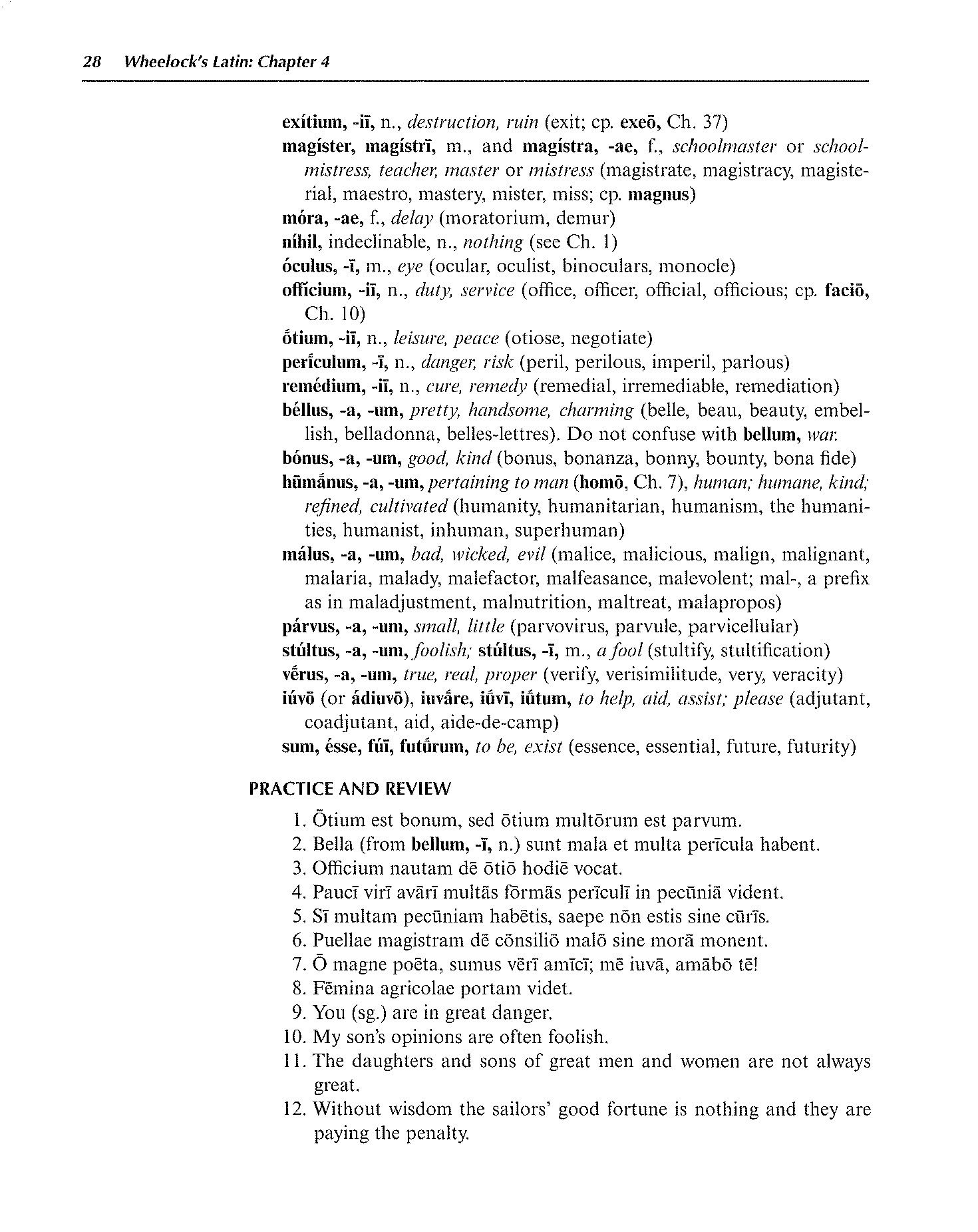
page_listing.tpl
page_subListingDetails.tpl
sub_listingDetails_style1.tpl
sub_listingDetails.title.tpl
esse to be
esse is a Latin Verb that primarily means to be.
Definitions for esse
Wheelock's Latin
Verb
- 1
to be, exist
English derivatives:
essence essential future futurity
Oxford Latin Dictionary
Verb
- 1
(forming a complete pred., without adjuncts). (esp. of persons) To be (continue) among the living; (of things) to be in existence. (b) (in pf. tenses) to have been (i.e. to exist no longer), be a thing of the past.
- 2
To have physical being, exist, be real; (sim., of actions) to have physical reality.
- 3
(expressing the fact of a thing's existence in a particular place, circumstances, etc.) To be, be found, occur (the idea expr. in English by 'there is', 'there are'). (b) (of abst. or non-material things). (c) (indicating availability for a purpose). (d) si ego non fuissem, nisi ego fuissem, if it had been for me (and sim.).
- 4
(in same sense as prec., introducing a fresh stage in a narrative, etc., also an item in an enumeration).
- 5
(of a state of affairs, condition, or sim.) To be present, obtain exist. (b) (of relationships, dealings, etc.; see also QVIS1, sense 7a, for quid mihi est cum..?). (c) quid (tibi) est? what is the matter (with you)?; (see QVIS1 sense 8a). (d) quid me (mihi, de me) futurum est? what is to become of me? (and sim.).
Pronoun
- 1
(old demonstrative pron.) Him, her, (pl.) them.
Sentences with esse
Latin to English
Cōgitō ergō sum.Compare I think therefore I am.
Esse quam vidērī.Compare To be rather than to seem.
Esse martyr non posset qui in ecclesia non est.Compare A man not in the Church cannot be a martyr.
Intestinus arma sum sumque plus populus magis exitium quam bellum externus, quam fames morbusve.Compare Intestine strife has been and will be to many nations a greater cause of destruction than foreign wars, than famine or pestilences.
Acerbus et miser sum, qui fateor ego fortuna noster cogo.Compare It is a bitter and sad thing, which our fortune compels us to confess.
Sum, fateor, semperque fui, Callistrate, pauper sed non obscurus nec male notus eques.Compare I confess, Callistratus, I am and always have been poor, though as a member of the equestrian order, never obscure nor ill-reputed.
Conjugation table for esse
Cactus2000
| ACTIVE | |
| Indicative present | Indicative imperfect |
| sum es est sumus estis sunt | eram erās erat erāmus erātis erant |
| Indicative perfect | Indicative pluperfect |
| fuī fuistī fuit fuimus fuistis fuērunt / fuēre | fueram fuerās fuerat fuerāmus fuerātis fuerant |
| Indicative future | Indicative future perfect |
| erō eris erit erimus eritis erunt | fuerō fueris fuerit fuerimus fueritis fuerint |
| Subjunctive present | Subjunctive imperfect |
| sim / fuam sīs / fuas sit / fuat sīmus sītis sint / fuant | essem / forem essēs / forēs esset / foret essēmus essētis essent / forent |
| Subjunctive perfect | Subjunctive pluperfect |
| fuerim fueris fuerit fuerimus fueritis fuerint | fuissem fuissēs fuisset fuissēmus fuissētis fuissent |
Infinitive present esse Infinitive perfect fuisse Infinitive future futūrum esse / fore | Imperative present es este Imperative future estō estō estōte suntō |
| PARTICIPLE | ||
| Participle present active | ||
| - | - | |
| - | - | |
| - | - | |
| - | - | |
| - | - | |
| Participle future active | ||
| futūrus | futūrī | |
| futūrus | futūrī | |
| futūrus | futūrī | |
| futūrus | futūrī | |
| futūrus | futūrī | |
| Participle perfect passive | ||
| - | - | |
| - | - | |
| - | - | |
| - | - | |
| - | - | |
| Gerundive | ||
| - | - | |
| - | - | |
| - | - | |
| - | - | |
| - | - | |
| Gerund | Supine | |
| - | - | |
| - | - | |
| - | ||
| - | ||
| - | ||
| PARTICIPLE | ||
| Participle present active | ||
| Nom. | - | - |
| Gen. | - | - |
| Dat. | - | - |
| Acc. | - | - |
| Abl. | - | - |
| Participle future active | ||
| Nom. | futūrus | futūrī |
| Gen. | futūrī | futūrōrum |
| Dat. | futūrō | futūrīs |
| Acc. | futūrum | futūrōs |
| Abl. | futūrō | futūrīs |
| Participle perfect passive | ||
| Nom. | - | - |
| Gen. | - | - |
| Dat. | - | - |
| Acc. | - | - |
| Abl. | - | - |
| Gerundive | ||
| Nom. | - | - |
| Gen. | - | - |
| Dat. | - | - |
| Acc. | - | - |
| Abl. | - | - |
| Gerund | Supine | |
| Nom. | - | - |
| Gen. | - | - |
| Dat. | - | |
| Acc. | - | |
| Abl. | - | |
Data sources
Notes
- Definitions
- Frederick M. Wheelock, Wheelock's Latin, 6th ed., rev. Richard A. LaFleur (New York, NY: HarperCollins Publishers, 2005): 28.
- P. G. W. Glare, Oxford Latin Dictionary, Vols. 1-8 (Oxford: Clarendon Press, 1982): 1865.
- Word frequencies
- Christopher Francese, "Latin Core Vocabulary," Dickinson College Commentaries, last modified 2014, http://dcc.dickinson.edu.
- Paul B. Diederich, The Frequency of Latin Words and Their Endings, PhD diss., (Columbia University, 1939).
- Louis Delatte, Suzanne Govaerts, Joseph Denooz, and Etienne Evrard, Dictionnaire fréquentiel et index inverse de la langue latine [Frequency Dictionary and Inverse Index of the Latin Language] (Liège, Belgium: Laboratoire d'analyse statistique des langues anciennes de l'Université de Liège [L.A.S.L.A.], 1981): 119.
Bibliography
Allen, Joseph H. Allen and Greenough's New Latin Grammar for Schools and Colleges: Founded on Comparative Grammar. Edited by James B. Greenough, George L. Kittredge, Albert A. Howard, and Benjamin L. D'Ooge. Boston, MA: Ginn & Company, 1903.
Crystal, David. A Dictionary of Linguistics and Phonetics. 6th ed. Oxford, UK: Blackwell Publishing, 2008.
Delatte, Louis, Suzanne Govaerts, Joseph Denooz, and Etienne Evrard. Dictionnaire fréquentiel et index inverse de la langue latine [Frequency Dictionary and Inverse Index of the Latin Language]. Liège, Belgium: Laboratoire d'analyse statistique des langues anciennes de l'Université de Liège (L.A.S.L.A.), 1981.
Diederich, Paul B. The Frequency of Latin Words and Their Endings. PhD diss., Columbia University, 1939.
Francese, Christopher. "Latin Core Vocabulary." Dickinson College Commentaries. Last modified 2014. http://dcc.dickinson.edu/latin-vocabulary-list.
Gildersleeve, Basil L., and Gonzales Lodge. Gildersleeve's Latin Grammar: Third Edition, Revised, and Enlarged. 3rd ed. London, England: Macmillan and Co., 1903.
Glare, Peter G.W. Oxford Latin Dictionary. Vols. 1-8. Oxford, England: Clarendon Press, 1982.
Krüger, Bernd. "Latin Conjugation Tables." Cactus2000. Accessed May 5, 2023. https://latin.cactus2000.de/index.en.php.
Pierson, Nick. "Sound of Text." Accessed October 26, 2019. https://soundoftext.com.
Wheelock, Frederick M. Wheelock's Latin. 6th ed. Revised by Richard A. LaFleur. New York, NY: HarperCollins Publishers, 2005.
Wiktionary Contributors. "Victionarium." Wikimedia Foundation, Inc. Updated March 18, 2019. https://la.wiktionary.org/wiki/Victionarium:Pagina_prima.
Citation
Chicago (17th ed.)
Allo Contributors. "sum, esse, fuī, futūrum (v.) - Latin Word Definition." Allo Latin Dictionary. Last modified . Accessed February 8, 2026. http://ancientlanguages.org/latin/dictionary/sum-esse-fui-futurum.
Entry created on . Last updated on .









